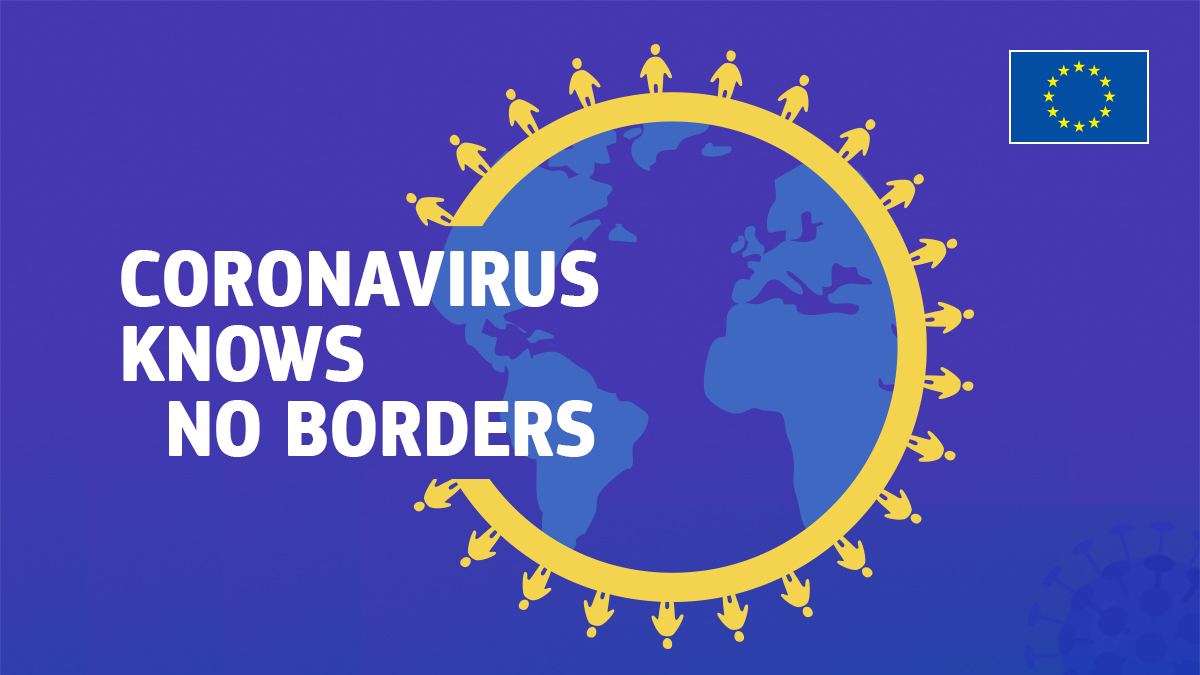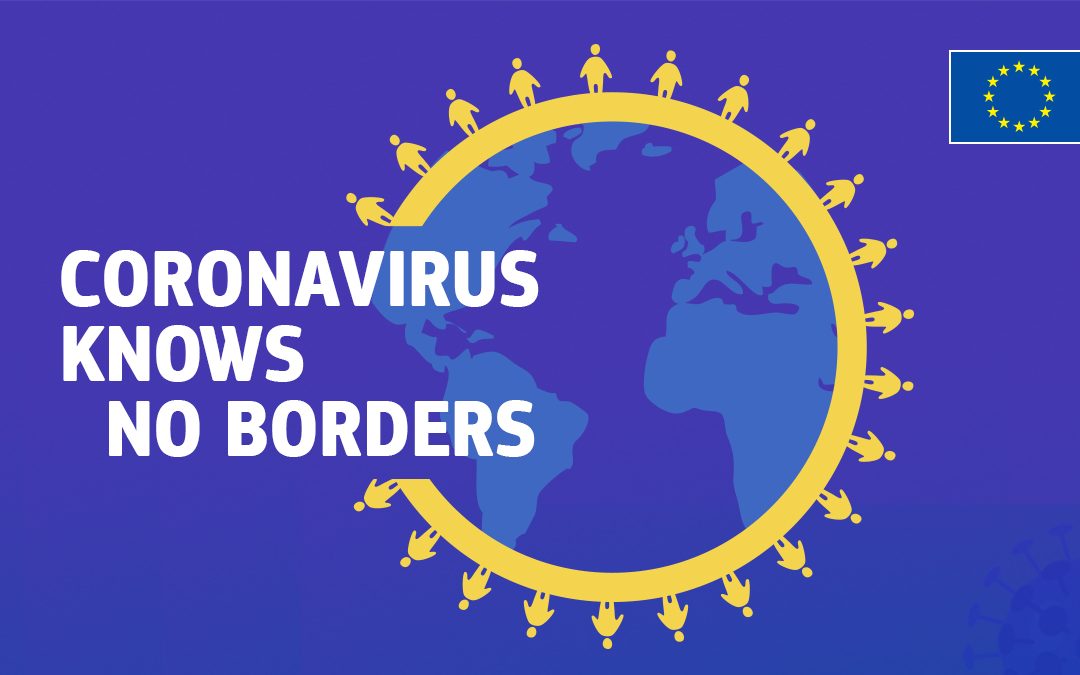On April 8, the European Commission presented the EU response to support partner countries’ efforts in tackling the coronavirus pandemic. The European Parliament will also adopt a resolution on this matter on April 16. That it is a substantial financial package is welcome. The Commission has announced a budget of more than €15.6 billion, taken from existing EU external action budgets to help partner countries address immediate humanitarian needs, including sexual and reproductive health and rights, strengthening research, health and water systems; and to address the social and economic consequences of the COVID-19 pandemic. However, as partner countries in Africa prepare for one of the largest crises of our time, implementation will be vital, focused as it should on key groups – young people, women, and girls – complimenting other EU and donor country actions in the near and long-term. Here’s what the DSW advocacy team in Brussels thinks of the Commission’s announcement.
COVID-19 is a global crisis where “a fast, massive and coordinated global response [is required] to protect all people” and that “it is in the EU’s interest to show solidarity with the world”. The package proposed by the Commission amounts to €15.6 billion, with around €3.3 billion dedicated to specific interventions, such as urgent, short-term emergency responses to humanitarian needs, and to strengthen health systems. The focus on Africa is important, as this partner continent is faced with greater challenges due to eroded health, water, sanitation, and nutrition systems.
That’s why we’re we’re analysing the Commission’s announcement through the following lens:
- Is it enough?
- Why implementation will be just as important as investment
-
SRHR needs to be part of the short and long term essential package
-
Coordination, involvement, and cooperation is key
-
Involve communities, particularly women and youth
-
Investing in global health research and innovation
-
- Putting health back on top of the EU’s agenda in future partnerships
Is this enough?
According to the United Nations Conference for Trade Development (UNCTAD), developing countries need about $2.5 trillion to respond to the COVID-19 crisis and its impact both direct and indirect to the economy. It is first and foremost a crisis of the health care systems with a direct impact on the economy. The sooner the health crisis is stopped, the less the negative impact on the economy.
Reallocated funds, rather than additional funds
2020 is the last year of the current EU budget multi-year budget cycle, meaning reserves are scarce and it is difficult to reallocate funding from one country to another, something which should be addressed in the next EU budget. Elsewhere, funds from the European Investment Bank (EIB) to support the socioeconomic response can be administered more flexibly. But while it’s possible to use these for health projects like testing facilities, there is no long term evaluation for projects like these, meaning no this model creates long-lasting impact for partner countries and their communities. This money is also difficult to use for most of the health system strengthening needs related to the COVID-19 response (for example, hiring and deploying health workers, buying equipment, and investing in facilities).
Implementation is as important as investment
How the money is implemented will make the difference as to how effective the EU’s plan really is.
SRHR needs to be part of the short and long term essential package
It is important the Commission has included SRHR as part of its urgent short-term response in the EU’s package, but we would have also liked to see the importance of focusing on SRHR reflected in the broader longer-term health response, as it is a continuous need for communities in partner countries. SRHR services must also be protected and promoted as part of a comprehensive health approach to strengthen health systems in partner countries. The way in which SRHR services will be included in the essential package of health intervention will depend on the programming, led by EU delegations in-country. This is why it is critical that EU officials in partner countries involve local communities and CSOs in preparing a response.
Right now, life-saving commodities need to be provided to partner countries. This includes critical equipment for the COVID-19 response, such as ventilators and personal protective equipment (PPE), but also those needed to deliver other key health services that are indirectly impacted by the pandemic. The containment measures imposed by governments across the world are causing disruption for schools and healthcare clinics, places where many young people and children got food and access to information and services. These disruptions are limiting young people’s access to sexual and reproductive health services, such as family planning or safe abortion, as they avoid facilities for the general population out of fear of judgment or stigma.
The EU needs to support new initiatives to ensure access to information, supplies, and services. Action for Global Health Uganda, DSW’s partner in Uganda, is using their existing truck to provide information and supplies to communities on SRHR and on COVID-19. Predicted shortages of sexual and reproductive health, and menstrual supplies must be taken into consideration in the EU’s future action.
Lock downs increase the incidence of gender-based violence and sexual exploitation, in particular for girls and young women trapped with their aggressors. Groups that are already marginalised in some countries – such as members of the LGBTI communities and sex workers – are at greater risk during this period, due to curfews and restrictive policing.
Coordination, involvement, and cooperation is key.
While other European donors have followed and complemented the Commission’s package, a strong and effective response will require a coordinated approach at country level with all donors to ensure that all aspects of health are covered and adequately resourced, and that other priorities are not neglected. Otherwise, countries will be left open to the consequences of future crises. Health is also a complex sector, requiring expertise, facilities, trained human resources, equipment, data systems, etc. And this crisis calls for a complex and comprehensive response: from provision of essential packages, health systems strengthening, ensuring universal access to health services, to focusing on global health research and development and accessibility of future treatments, diagnostics and vaccines.
Involve communities, particularly women and youth.
Vulnerable and marginalised people are disproportionately affected by COVID-19. While the virus was thought to first affect elderly people and men, it is now clear that it can affect everyone, in particular people with suppressed immune systems, the case for millions of young people in Africa. The largest group that will be directly and indirectly affected by COVID-19 on that continent will be women and young people. The virus has exacerbated already existing inequalities for women and girls – they make up the large majority of health workers on the crisis’ frontline. Read Mercy Kioko’s testimony – one of DSW’s youth champions in Kenya – to find out why young people and women face the burden of the pandemic’s consequences.
While we appreciate the fact that the EU response acknowledges the specific impacts of COVID-19 on women, there is no such recognition for young people.
As an organisation focusing on the needs and potential of young people, DSW underlines the importance of assessing and adequately addressing the impact of COVID on youth:
- The EU should include women and youth at the heart of its global response: the impact of COVID19 on these groups should be assessed and adequately addressed. The EU should fully involve women and young people, listening to their voices and empowering them to be an active part of the response to the pandemic.
- With the restrictions on public space, the democratic space has also suffered, even more so in places where the civic space was already shrinking. It is paramount that EU delegations find alternative ways to engage with communities and CSOs during this period.
If donors and governments fail to involve local actors and communities, their response will fail. This is one of the key lessons from the Ebola crisis. That crisis shows us the power of international cooperation in finding long term solutions for infectious diseases – research and innovation put to use to end the spread of the disease.
Investing in global health research and innovation
The package’s strong emphasis on the importance of research and innovation is a good sign that the EU takes seriously the role of innovation in responding to global health challenges.
Both direct support to research efforts to develop effective treatments, vaccines, therapeutics, and diagnostics, as well as indirect support to partner countries’ research capacities will be essential for developing the tools that can end the COVID-19 epidemic.
The Commission’s package envisages the possibility of increasing the resources of the European and Developing Countries Clinical Trials Partnership (EDCTP) to enable its extension to southern Mediterranean countries. More resources should be made available to ensure that already-scarce funding for research and innovation on existing epidemics (HIV & AIDS, TB, malaria, etc.) is not cut by diverting funding to the COVID-19 response. Equally, health research and innovation funding for collaboration with sub-Saharan Africa should not be diluted by allowing northern African countries (with much stronger research systems) to compete in the same calls for proposals under the EDCTP programme.
We welcome that the package foresees “fast-tracking approval and subsidising vaccines and their delivery in vulnerable countries” once a vaccine is available, but at the same time need to reiterate the crucial importance of the adherence to ethical protocols and performing all necessary steps to guarantee safety and efficacy of any product despite the urgency and time constraints.
New tools cannot save lives if they are not accessible for the most vulnerable populations. It’s good then that the EU aims to “ensure universal availability at an affordable price of future products” and to “secure high-level political commitment to ensuring equitable access to products created to tackle this pandemic”. All EU funding for COVID-19 research and innovation needs to include binding rules to guarantee open access to research results and data, and importantly provide mechanisms to ensure the availability and affordability of the end products worldwide. Only by ensuring that everyone has access to treatment or to a vaccine will COVID-19 become a threat of the past.
Putting health back on top of the EU’s agenda in future partnerships
There will be many lessons learned from this crisis. The obvious one is that we undervalue so-called ‘basic’ services, or life saving services. Health has always been recognised as a key aspect of resilience. But it has been chronically deprioritised over the last decade by donors, and often not a focal sector for bilateral collaboration in the EU’s development cooperation.
While addressing the immediate humanitarian needs of partner countries with life-saving interventions is essential, the EU needs to scale up its long-term support to health systems, and health research in partner countries. In the long term, the EU needs to put health on the top of its agenda with partner countries. Future policies, such as the upcoming renewed Strategy with Africa referenced by the package communication, needs to comprehensively address health, including neglected areas such as PRNDs, emerging infectious diseases, increasing antimicrobial resistance and SRHR.
The COVID-19 pandemic is a wake up call ahead of the next EU budget. The EU should boost its support to health sectors in partner countries through the EU’s future funding instruments for development and cooperation, and its programming and investment on health in the next research programme, Horizon Europe.
Ebola, H1N1, SARS, or existing rampant crises like TB. There is no excuse. Now is the time to invest. We need to be ready for the next virus, or there will be no next time.


